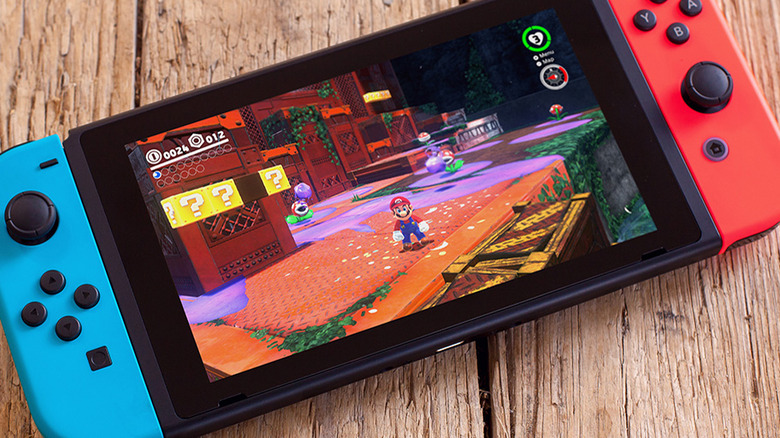Things Keep Getting Worse For Nintendo Switch
The Nintendo Switch has run into some major shortages in recent months. Unfortunately, it looks like these shortages will continue for at least the immediate future. During a recent investors Q&A (via TheGamer), Nintendo president Shuntaro Furukawa explained that it has become increasingly difficult for the company to produce new Nintendo Switch consoles. This is due to a shortage in supplies and difficulty in purchasing the parts necessary for manufacturing the Switch.
Furukawa expects these shortages to continue through the summer. However, he cautions that further delays may materialize if COVID-19 continues to be an issue throughout the year.
This pretty much lines up with Furukawa's statement earlier this year. Back in February, Nintendo addressed the shortages that were yet to come. At the time, Furukawa described these shortages as "unavoidable," mainly because of where the majority of production was located. Although Nintendo had started moving some of its production plants from China to Vietnam in 2019, production was still affected by shutdowns resulting from the outbreak. After the spread of COVID-19, it seems that moving production to Vietnam also became a moot point. With widespread business closures and social distancing strategies in effect, it appears as though production has slowed to a crawl.
This has not just impacted production of the consoles themselves, unfortunately. Many of the officially branded accessories and peripherals for the Nintendo Switch are seeing similar manufacturing delays. This includes items like the Ring-Con controller, which was already somewhat difficult to come by. And now that we've seen that it's possible to play Dark Souls with a Ring-Con, it's even more of a bummer that we can't find one in stores.
Last month, Nintendo announced its intention to increase production to meet the current high demand. The current plan is for the company to manufacture around 22 million units this year, which is a 20% increase from its original plans. The hope was that Nintendo would have plenty of Switches on the shelves by June. However, that increased output is only sustainable for as long as there are available parts.
The manufacturing issues were already enough of an obstacle in the way of people getting their consoles. Making things more difficult, however, are recent reports that bots are being used to buy up remaining systems as quickly as possible. Some third party sellers utilized a program called Bird Bot that allowed them to buy Switches as soon as they were in stock online. These unscrupulous sellers then turned around and resold the Switches at an inflated price point. According to GameSpot, some of these resellers were listing Nintendo Switches at an absurd $600.
However, the shortage doesn't mean that Nintendo has lost out on revenue. In fact, part of the reason for the shortage appears to be because of just how well the company did during the first part of this year. According to industry analyst Daniel Ahmad, Nintendo's year-to-date sales are up 75%. This is due to a few different factors, but the main ones are the onset of the pandemic and the release of Animal Crossing: New Horizons.
Nintendo manufactured a surplus of systems to go with the release of the highly anticipated New Horizons. With many people getting ready to stay indoors for an extended period of time, fans snatched up New Horizons (and a Switch to play it on) as soon as they could. This accounted for Nintendo seeing a massive spike in sales in April.
According to Ahmad, the scarcity of the Switch began when Nintendo first announced the impending shortage in February. However, these numbers were offset a bit by the Nintendo Switch Lite's availability. Ahmad says that these factors have led to a "Higher than expected demand" for the Nintendo Switch. Despite this sales spike, the shortage could still become a problem.
Nintendo isn't the only company experiencing manufacturing setbacks during this time. Sony reportedly plans to release a limited number of PlayStation 5 consoles during the new system's first year. This is due in part to the uncertain nature of its release window and the cost of materials needed to produce new consoles.
It remains to be seen whether Nintendo will be able to make good on its promise to get more Switches in stores by June. At the very least, it appears as though Nintendo is exploring its options and is remaining transparent with fans. Hopefully the pandemic won't continue to hurt the company's projected manufacturing numbers and more folks can settle in with Animal Crossing and Pokemon.

